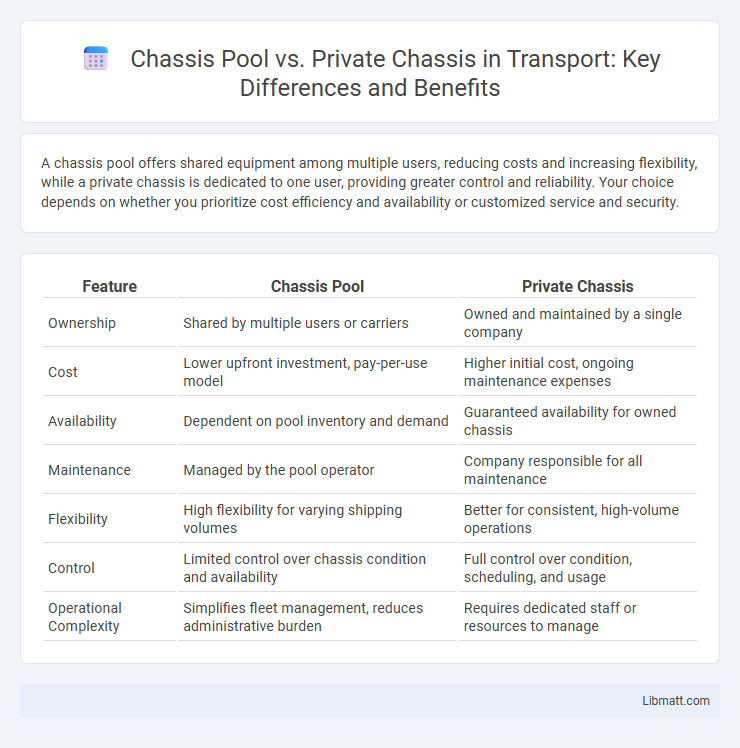A chassis pool offers shared equipment among multiple users, reducing costs and increasing flexibility, while a private chassis is dedicated to one user, providing greater control and reliability. Your choice depends on whether you prioritize cost efficiency and availability or customized service and security.
Table of Comparison
| Feature | Chassis Pool | Private Chassis |
|---|---|---|
| Ownership | Shared by multiple users or carriers | Owned and maintained by a single company |
| Cost | Lower upfront investment, pay-per-use model | Higher initial cost, ongoing maintenance expenses |
| Availability | Dependent on pool inventory and demand | Guaranteed availability for owned chassis |
| Maintenance | Managed by the pool operator | Company responsible for all maintenance |
| Flexibility | High flexibility for varying shipping volumes | Better for consistent, high-volume operations |
| Control | Limited control over chassis condition and availability | Full control over condition, scheduling, and usage |
| Operational Complexity | Simplifies fleet management, reduces administrative burden | Requires dedicated staff or resources to manage |
Introduction to Chassis Pools and Private Chassis
Chassis pools provide shared access to shipping container chassis, allowing multiple users to utilize the same equipment, which can reduce costs and improve operational flexibility. Private chassis are owned and maintained by a single company, offering more control, reliability, and customization tailored to specific logistical needs. Understanding the differences helps You optimize your supply chain by selecting the most efficient chassis solution for your operations.
Understanding Chassis Pool Operations
Chassis pool operations streamline container handling by allowing multiple carriers to share a common fleet of chassis, reducing costs and improving asset utilization. In contrast, private chassis systems involve ownership and exclusive use of chassis, requiring carriers to manage maintenance and inventory independently. Efficient chassis pool management relies on coordination between terminals, carriers, and pool operators to balance availability and minimize delays.
What Are Private Chassis?
Private chassis are freight containers or trailers owned and maintained by individual shippers or carriers, rather than being leased from third-party chassis pool providers. These privately owned chassis offer shippers greater control over availability, maintenance schedules, and customization to fit specific operational needs, reducing dependency on external chassis pools. Utilizing private chassis can lead to improved efficiency in cargo handling and transportation logistics within supply chains.
Ownership and Maintenance Responsibilities
Chassis pools involve shared equipment owned by trucking companies, leasing firms, or port authorities, distributing maintenance responsibilities among all users to ensure operational efficiency and cost-effectiveness. Private chassis are owned and maintained solely by individual companies, granting full control over inspections, repairs, and upgrades, which often results in higher maintenance standards but increased operational costs. Choosing between chassis pool and private chassis ownership impacts logistics strategies, balancing shared asset management against dedicated equipment control.
Cost Comparison: Chassis Pool vs Private Chassis
Chassis pool services typically offer lower upfront costs by sharing equipment among multiple users, reducing capital expenditures and maintenance fees. Private chassis require significant initial investment and ongoing maintenance, which increases total cost of ownership but offers greater control and customization. Companies must weigh the cost efficiency of pooled chassis against the operational benefits of private chassis based on usage frequency and fleet requirements.
Efficiency and Turnaround Times
Chassis pools improve efficiency by providing flexible access to multiple chassis units, reducing wait times and minimizing delays in loading and unloading processes. Private chassis offer faster turnaround times for shippers relying on dedicated equipment, ensuring consistent availability and control over maintenance schedules. Your choice impacts operational flow, with chassis pools suited for variable demand and private chassis ideal for predictable, high-volume needs.
Flexibility and Scalability Considerations
Chassis pools offer greater flexibility by allowing carriers to access a shared fleet of chassis, optimizing asset utilization and adapting quickly to fluctuating demand. Private chassis provide consistent availability and control, benefiting companies with stable, high-volume shipping needs that require predictable equipment allocation. Scalability is more efficient with chassis pools since carriers can scale resources up or down without the capital investment of owning chassis, while private chassis demand upfront costs and longer-term commitments.
Regulatory and Compliance Aspects
Chassis pools streamline regulatory compliance by centralizing maintenance records and ensuring adherence to safety standards across multiple users, reducing liability risks. Private chassis require shippers or carriers to maintain individual compliance protocols, which can increase administrative burdens and potential for regulatory lapses. The consolidated oversight in chassis pools supports adherence to FMCSA regulations, DOT inspections, and environmental standards more efficiently than disparate private chassis management.
Impact on Supply Chain Management
Chassis pool systems streamline supply chain management by providing flexible access to a shared fleet of standardized chassis, reducing wait times and storage costs. Private chassis ownership offers greater control and customized maintenance schedules, enhancing reliability and asset management but increasing capital expenditure and responsibility for upkeep. Your choice directly affects operational efficiency, cost management, and the overall agility of your logistics network.
Choosing the Right Chassis Solution for Your Business
Selecting between a chassis pool and a private chassis involves understanding your business's logistical needs and shipment frequency. A chassis pool offers cost-efficiency and flexibility with shared chassis, ideal for businesses with variable shipping volumes. Your decision should weigh factors like operational control, maintenance responsibility, and long-term cost implications to optimize supply chain efficiency.
chassis pool vs private chassis Infographic

 libmatt.com
libmatt.com